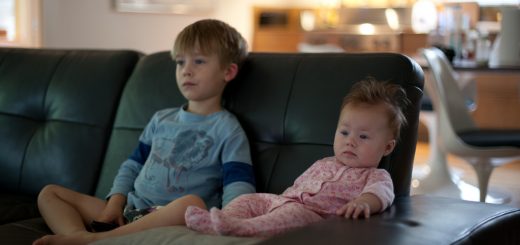Ahead to the past

Here is my sister’s travelogue from her recent visit to our mother’s birthplace in Berlin:
I had to choose whether to fly with my husband and two of our boys to Berlin, or whether to stay home and have a few quiet days to myself. “Mom, you can do whatever you like,” said the boys, probably wishing in a way for a ‘guys’ trip just with their father, “but just decide quickly.” I chose Berlin.
I felt a bit awkward telling family and friends that we were going to Berlin on vacation. Most Jews likely feel ambivalent about visiting Berlin. On one hand there is a certain curiosity to see the city that begot one of the greatest horrors in human history. On the other hand there is a feeling of disgust and terror at actually being there. But it has a special meaning for me. Berlin is my mother’s birthplace. She lived there until the outbreak of World War II at which time she was fortunate to be able to leave on a kindertransport to England.
My parents traveled to Berlin in 1996 as guests of the Berlin government. Before my trip, I went through their photographs and wrote down the address of my mother’s former home. My mother explained that the address, 33 Brunnenstrasse, is actually the entrance to a courtyard surrounded by several apartments and that when my mother was a girl it also included a synagogue called Bnei Zion. My parents had found it all more or less intact ten years ago, and my mother eagerly described to me exactly where her apartment was and which staircase to take to reach it. She urged me to knock on her former front door, as she had not had the courage to do so ten years earlier.
On the third afternoon of our trip my husband and I and our two boys set off to find 33 Brunnenstrasse. As we usually do our touring by foot, and we had already done several hours of walking that day, this adventure was met with perhaps a little bit less enthusiasm than I would have liked. No matter; I assured them that it would be most worthwhile.
My mother’s former home is in what was referred to as East Berlin before the fall of the Berlin Wall and Communism. Today, it is a poor, graffiti covered and neglected neighborhood, still not having recovered from the Communist era.
It was a long walk and not easy to find. We finally spotted number 33 and to our utter amazement standing at the entrance was a Yeshiva bochur replete with black hat, dark suit, white shirt and flowing tzitzis. Was this a mirage? Where were we?
We were indeed at 33 Brunnenstrasse, only today it is home to the Yeshiva Gedola and Kollel of Berlin. The young gentleman at the front door explained to us that about a month earlier the Yeshiva had moved there from different location in Berlin. Apparently a wealthy secular Jew had purchased the entire 33 Brunnenstrasse apartment complex and, upon becoming religious, he had donated it to the Yeshiva.
Today it is undergoing major renovations. My mother’s apartment is now part of a modem dormitory and the former Bnei Zion shul is in the process of being converted into a Beis Medrash and dining hall. Although the construction is far from complete, the Yeshiva is fully operational with boys from all over Germany and several who come from the U.S. for varying lengths of time. Two had arrived a few hours earlier from Waterbury, Connecticut. Some of the other apartments are already occupied by the Kollel families and one is being used as a kindergarten for the Kollel children.
As we stood around trying to absorb what we were hearing and seeing, we realized that the Yeshiva was beginning to daven Mincha. My husband and sons joined in their minyan, an experience that they will remember for a long time.
We were overwhelmed.
Sixty seven years earlier my mother and her family were forced out of their home and shul by the Nazis. Today on that spot stands a living, viable, growing Yeshiva, exactly what the Germans sought to eliminate. A most worthwhile trip, indeed.
Chana Sorotzkin, October 2006



“Mir Velen Zey IberLeben”–We will outlive them!
The AlMighty does not forsake His people.
This is a very thought-provoking piece. On one hand, we see the resurgence of Torah in the world, and that is good. On the other, we see the trap of golus. Perhaps Hashem is telling us that golus (exile) is not over yet so fast…
Terrific story.